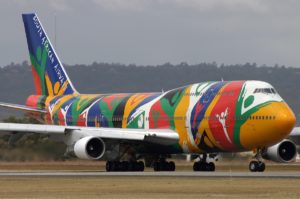TANZANIA (eTN) – Looking ahead to the forthcoming Africa Travel Association (ATA) Annual World Tourism Conference in Rwanda later this year, airlines flying within and outside the African continent are counted as the leading key partners to African tourism growth.
In collaboration with the Rwanda Development Board, the 41st ATA Congress is designed to set the tone for how tourism can be utilized as an engine for economic growth and job creation through innovative business models, new technologies, and strategic partnerships.

Airlines and aviation logistics managers across the world will be among key and invited speakers to discuss their views about the African skies and the role that airlines play to foster tourism development on this continent.
South African Airways (SAA) is on top, among the key players to African tourism through air connections between the continent and the key tourist markets across the world.
The South African Department of Transport says it is “looking closely” to see that African airlines dominate Africa’s air space.
SAA’s investment in aircraft is the target that the South African Department of Transport is looking at, to ensure that the airline contributes greatly to development of the African skies.
The airline is this year celebrating a decade of operations as a member of Star Alliance, the world’s longest-serving and most-experienced global airline alliance.
SAA was the first African airline to join the global network in 2006, providing other Alliance partners access to SAA’s extensive route network within South Africa and into the rest of the African continent.
“South African Airways gave Star Alliance a first and strategic/prominent foothold in Africa, which today is recognized as one of the most significant growth markets for international trade and aviation,” said Star Alliance Chief Executive Officer (CEO), Mark Schwab.
“We congratulate the airline on its 10-year anniversary as part of the Star Alliance family, thank its staff for serving Star Alliance customers well every day for a decade, and look forward to continued fruitful cooperation in the years to come.”
Ethiopian Airlines is Africa’s biggest and fastest-growing airline. Ethiopian Airlines’ CEO, Tewolde Gebremarian, said that Africa is the next and final frontier in globalization, adding that he wants to “see African aviation is growing very fast in line with the economic development of the continent.”
“Road transport is underdeveloped, railway transport is underdeveloped, the terrain of the continent is a challenge, so air transport is a key essential public service. And it has to be seen as such,” he added.
Ethiopian Airlines is the first airline company in Africa to have purchased Airbus A350 aircraft. It spent more than US$2 billion on the deal, which includes other smaller aircraft.
The airline’s Regional Manager in South Africa, Abel Alemu, was also quoted as saying the aircraft had been purchased as part of its strategy to stay competitive in the aviation market.
He said the Airbus A350 had new technology and was 25 percent more fuel efficient than other types of aircraft.
“One part of that strategy is fleet management, because when it comes to the aviation industry, aircraft is the major factor. If you have an efficient aircraft, it will contribute to costs and customer comfort,” said Alemu.
He said Ethiopian Airlines was 100 percent owned by the Ethiopian government, but run by professionals appointed by a board.
The airline flies to 92 destinations around the world and 52 in Africa. The airline recorded a $148 million profit in the year that ended June 2015.
The South African Department of Transport’s Acting Deputy Director-General, Johan Bierman, said Ethiopian Airlines’ investment meant African airlines would take up space on the continent’s aviation market instead of airlines from outside the continent.
Kenya Airways, during the month of August 2016, is increasing operations on its Nairobi to Amsterdam route. Overall frequency will increase from 7 to 9 weekly.
Operating a fleet of modern aircraft, Kenya Airways dominates the East African skies and provides an air link to West Africa, flying to key destinations there.
Kenya Airways, of which the government of Kenya is the largest shareholder with a 29.8 percent stake, is operating with modern aircraft with a fleet of 38 big airplanes flying in the East African region and other African skies.
The airline connects the Kenyan capital of Nairobi to big cities in Africa, the Middle East, China, India, and Europe. Kenya Airways is among the few and leading air carriers connecting the African continent to Europe and America, attracting tourists to East Africa.
The African Union (AU) Commission aims to establish a single African air transport market by 2017, but implementation of the Yamoussoukro Declaration, signed in 1999 to effect this, has been slow. African states prefer to sign bilateral agreements with Middle Eastern and European states instead of opening their airline markets to regional competition.
“There is no use in having a single African sky if you don’t have any aircraft to actually fly in it,” said Bierman. “We are looking at Kenya Airways in that regard. We are also looking closely at our own airline, SAA, to see what they can come up with. We are positive that we could (make this kind of investment) although that is not within the Department of Transport’s mandate,” he said.
Speaking at Indaba 2016 mid-this year, Derek Hanekom, South Africa’s Tourism Minister, said: “Air transport services remain a key constraint. Many major airlines fly to Africa from North America, Europe, and Asia. But, once visitors reach the continent, they encounter difficulties in traveling from country to country.”
Source:eTN

Leave a Reply